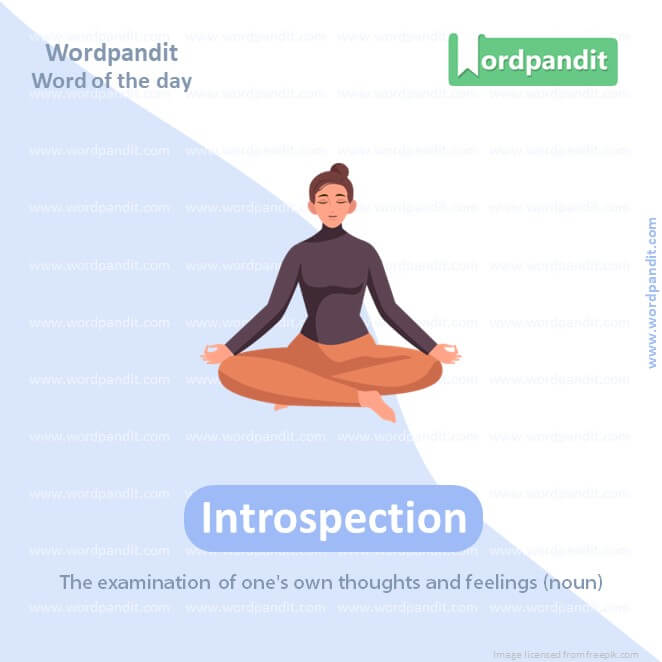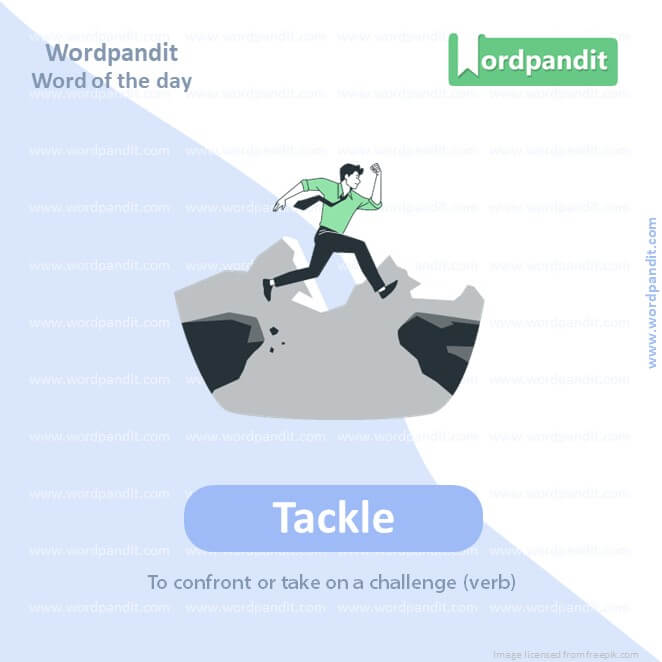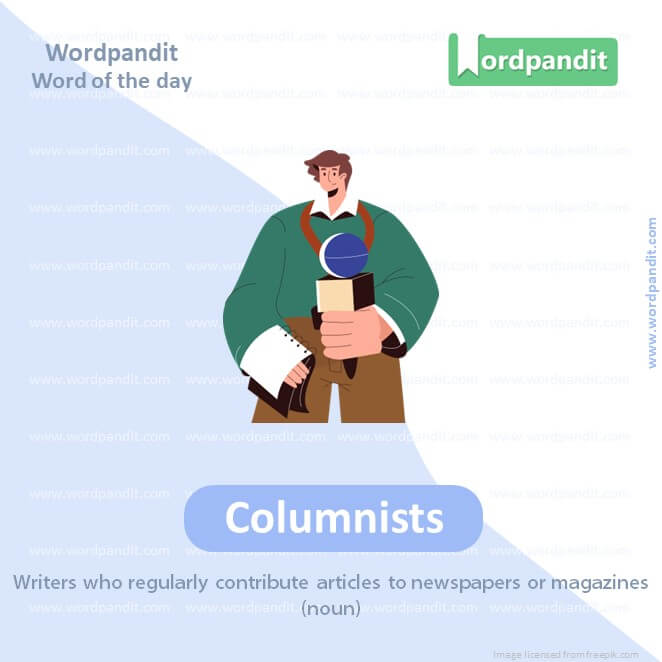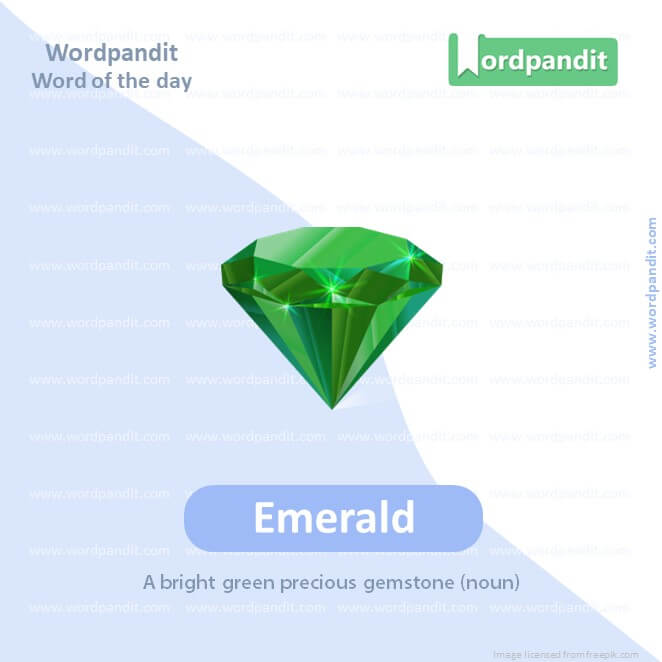Daily Vocabulary Words: List of Daily Used Words in Leading International Newspapers
Hi there. Welcome to this special section @ Wordpandit.
Our endeavour here is very simple: to highlight important daily vocabulary words, which you would come across in leading newspapers in the country. We have included the following newspapers in our selection:
• The New York Times
• The Washington Post
• Scientific American
• BBC
• The Guardian
• Psychology Today
• Wall Street Journal
• The Economist
We are putting in extensive work for developing your vocabulary. All you have got to do is be regular with this section and check out this post on a daily basis. This is your repository of words that are commonly used and essentially, we are posting a list of daily used words. Hence, this has significant practical application as it teaches you words that are used commonly in leading publications mentioned above.
Visit the website daily to learn words from leading international newspapers.

WORD-1: Introspection
CONTEXT: These are some of the big questions that always kick around at the start of January — happy new year, by the way! — a time for resolve and the serious introspection that (hopefully) precedes it.
SOURCE: The Washington Post
EXPLANATORY PARAGRAPH: Introspection is like taking a moment to think deeply about your own thoughts and feelings. It’s like when you think about why you feel happy or sad, or why you like certain things.
MEANING: The examination of one’s own thoughts and feelings (noun).
PRONUNCIATION: in-truh-spek-shun
SYNONYMS: Self-examination, reflection, self-analysis, contemplation, self-observation.
USAGE EXAMPLES:
1. Introspection helped him understand his emotions better.
2. The book encourages introspection and self-discovery.
3. She valued quiet moments for introspection.
4. Through introspection, he realized his true ambitions.

WORD-2: Tackle
CONTEXT: Our columnists are questioning, too, just on a slightly larger scale; to ring in the new year, a handful of Post Opinions writers will tackle what they see as the biggest question on their particular beat for 2024 and beyond.
SOURCE: The Washington Post
EXPLANATORY PARAGRAPH: Tackle means to deal with a problem or a task. It’s like when you have a big puzzle and you start putting the pieces together to solve it.
MEANING: To confront or take on a challenge (verb).
PRONUNCIATION: tak-uhl
SYNONYMS: Address, confront, undertake, handle, approach.
USAGE EXAMPLES:
1. She decided to tackle the problem head-on.
2. The new policy aims to tackle poverty.
3. He tackled the project with enthusiasm.
4. It’s time to tackle these repairs.

WORD-3: Columnists
CONTEXT: Our columnists are questioning, too, just on a slightly larger scale; to ring in the new year, a handful of Post Opinions writers will tackle what they see as the biggest question on their particular beat for 2024 and beyond.
SOURCE: The Washington Post
EXPLANATORY PARAGRAPH: Columnists are people who write regular articles or pieces in newspapers or magazines. It’s like having a special job where you get to tell people your ideas or news in writing regularly.
MEANING: Writers who regularly contribute articles to newspapers or magazines (noun).
PRONUNCIATION: kol-uh-mists
SYNONYMS: Commentators, journalists, writers, correspondents, reporters.
USAGE EXAMPLES:
1. The newspaper featured several well-known columnists.
2. She aspired to be a columnist for a major magazine.
3. Columnists often express their personal opinions in their writings.
4. Famous columnists can have a big influence on public opinion.
WORD-4: Flurry
CONTEXT: Karen Tumulty is already asking the big question that usually comes after the flurry of resolve and reinvention: Is this who we are?
SOURCE: The Washington Post
EXPLANATORY PARAGRAPH: Flurry is like a quick, short burst of something, often something moving fast. Imagine a sudden burst of snowflakes swirling around quickly; that’s a flurry of snow.
MEANING: A small, brief, and often sudden burst or commotion (noun).
PRONUNCIATION: flur-ee
SYNONYMS: Burst, gust, outburst, spurt, rush.
USAGE EXAMPLES:
1. A flurry of activity followed the announcement.
2. Snowflakes fell in a gentle flurry.
3. There was a flurry of excitement as the celebrity arrived.
4. The news caused a flurry of reactions.

WORD-5: Inoculation
CONTEXT: For Karen’s beat, the question refers to national political identity. For years, Karen writes, the negating mantra of “this is not who we are” has been a constant inoculation against the ugliness of the MAGA movement.
SOURCE: The Washington Post
EXPLANATORY PARAGRAPH: Inoculation is like getting a little bit of medicine to protect you from getting sick. It’s like wearing a raincoat to stay dry in the rain.
MEANING: The act of protecting against disease by introducing a vaccine into the body (noun).
PRONUNCIATION: in-ok-yuh-lay-shun
SYNONYMS: Vaccination, immunization, injection, prevention, prophylaxis.
USAGE EXAMPLES:
1. Inoculation against the flu is recommended annually.
2. The doctor explained the benefits of inoculation.
3. Many diseases have been controlled through widespread inoculation.
4. There was a campaign to increase inoculation rates.
WORD-6: Negating
CONTEXT: For Karen’s beat, the question refers to national political identity. For years, Karen writes, the negating mantra of “this is not who we are” has been a constant inoculation against the ugliness of the MAGA movement.
SOURCE: The Washington Post
EXPLANATORY PARAGRAPH: Negating is like saying ‘no’ or cancelling something out. It’s like if someone says you can have a cookie and then says you can’t, they’re negating the first thing they said.
MEANING: Nullify or make ineffective (verb).
PRONUNCIATION: nee-gay-ting
SYNONYMS: Cancel, nullify, invalidate, counteract, negate.
USAGE EXAMPLES:
1. His later actions ended up negating his earlier efforts.
2. The contract had a clause negating any previous agreements.
3. Her apology was negated by her subsequent behavior.
4. The new evidence negated the need for further investigation.

WORD-7: Emerald
CONTEXT: Anne Lamott has been reflecting on aging and death in her columns, too, and the account we published last month of a recent wintry walk of hers is full of the colors Avis pulled from: dark earth, an indigo ocean, a freezing emerald lake that invites a crystal dip.
SOURCE: The Washington Post
EXPLANATORY PARAGRAPH: An emerald is a type of precious stone that is green in color. It’s like a really special rock that people use in jewelry because it’s so pretty and shiny.
MEANING: A bright green precious gemstone (noun).
PRONUNCIATION: em-er-uhld
SYNONYMS: Gem, beryl, jewel, precious stone, green stone.
USAGE EXAMPLES:
1. The crown was adorned with emeralds and diamonds.
2. She wore a beautiful emerald necklace.
3. Emeralds are known for their vibrant green color.
4. The ancient city was called the “City of Emeralds.”
WORD-8: Perennial
CONTEXT: “When I can no longer walk,” she says, “I will sit outside with them, gaze into their faces, and look up. That is the perennial instruction: Look up! Looking up gives us freedom and causes the shadows to slip right down our backs.”
SOURCE: The Washington Post
EXPLANATORY PARAGRAPH: Perennial is like something that keeps coming back or happening over and over, like how some flowers keep growing back every year.
MEANING: Lasting or existing for a long or apparently infinite time; enduring (adjective).
PRONUNCIATION: puh-ren-ee-uhl
SYNONYMS: Enduring, everlasting, perpetual, constant, continuous.
USAGE EXAMPLES:
1. She grew perennial flowers in her garden.
2. The issue of water conservation is a perennial concern.
3. Their friendship was perennial, lasting many years.
4. The play has remained a perennial favorite.
WORD-9: Reckoning
CONTEXT: Only an event as terrible as the Holocaust could paper over this schism, Moser writes. But uncovering those old divisions today, he argues, is key to reckoning with what Zionism and the opposition to it really are.
SOURCE: The Washington Post
EXPLANATORY PARAGRAPH: Reckoning is like counting or figuring something out. It’s when you try to understand something by thinking about it or adding it up.
MEANING: The act of calculating or estimating something; a person’s view, opinion, or judgment (noun).
PRONUNCIATION: rek-uh-ning
SYNONYMS: Calculation, estimation, computation, judgment, assessment.
USAGE EXAMPLES:
1. They were waiting for the final reckoning of votes.
2. In his reckoning, the project was not feasible.
3. The day of reckoning had arrived for the company.
4. Her reckoning of the situation was accurate.
WORD-10: Peripheral
CONTEXT: By 2018, 13.8 percent of people in peripheral nations made more than the median of $8,898 in Greece, which had taken Portugal’s place.
SOURCE: The Washington Post
EXPLANATORY PARAGRAPH: Peripheral means something that is on the edge or not the main part of something. It’s like when you see something out of the corner of your eye; it’s there, but it’s not what you’re focused on.
MEANING: Relating to or situated on the edge or periphery of something (adjective).
PRONUNCIATION: puh-rif-uh-rul
SYNONYMS: Marginal, outer, secondary, ancillary, sideline.
USAGE EXAMPLES:
1. Peripheral vision helps you see things to the side.
2. They discussed the peripheral issues but not the main problem.
3. The peripheral areas of the city were less developed.
4. He was only peripherally involved in the project.
Vocabulary Words with Meaning, Synonyms and Antonyms PDF
The voyage to language mastery often involves decoding the ‘vocabulary words with meaning, synonyms and antonyms PDF’. This valuable resource is a treasure chest of words, offering definitions, similar phrases, and contrasting expressions all in one place. Yet, recognizing the full potential of ‘vocabulary words with meaning, synonyms, and antonyms PDF’ entails more than just glossing over the words, it demands active and strategic engagement.
To uncover the richness of ‘vocabulary words with meaning, synonyms and antonyms PDF’, focus on understanding the context of each word, along with its synonyms and antonyms. Group words under themes to create word maps, linking synonyms and contrasting antonyms, for a better grasp of the material.
When delving into a ‘vocabulary words with meaning, synonyms and antonyms PDF’, use annotation tools for an interactive study experience. Make personal notes about each word and how you connect with it. This personalized touch aids in memorization and enhances recall.
To cement the learning from ‘vocabulary words with meaning, synonyms and antonyms PDF’, regular revision is pivotal. Spaced repetition, a learning technique where intervals between each review are gradually increased, can significantly enhance long-term memory retention.
The most crucial aspect, however, is practical application. The ‘vocabulary words with meaning, synonyms and antonyms PDF’ should act as a springboard for real-world application. Incorporating learnt words, along with their synonyms and antonyms, in conversations or digital interactions, reinforces understanding and boosts fluency.
In conclusion, navigating the ‘vocabulary words with meaning, synonyms and antonyms PDF’ is a cerebral adventure. A blend of contextual learning, annotation, regular revision, and practical application makes the journey a rewarding one. Grasping ‘vocabulary words with meaning, synonyms and antonyms PDF’ not only enriches your language skills but also adds vibrancy to your linguistic expressions.











